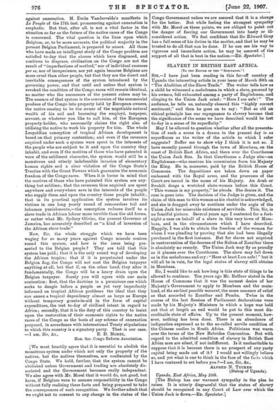SLAVERY IN BRITISH EAST AFRICA.
!TO THE EDITOR OF THE SPECTATOR:1 SIR,—I have just been reading in this far-off country of Uganda the interesting article in your issue of March 30th on "The Abolition of the Slave Trade.". The writer tells how as a child he witnessed a melodrama in which a slave, pursued by his owners, fell exhausted among a party of Englishmen, and clinging to the Union Jack cried: "Here I am safe!" The audience, be tells us, naturally cheered .this " highly correct sentiment," and then he goes on to say : "But so old an ethical principle has our repugnance to slavery become that the significance of the scene we have described would be lost to-day in a sense of its superfluity."
May I be allowed to question whether after all the presenta- tion of such a scene in a drama in the present day is as superfluous as the writer of the article to which I refer suggests ? Suffer me to show why I think it is not, so. have recently passed through the town of Mombasa, on the coast of British East Africa, and there over the. Courthouse the Union Jack flies. In that Courthouse a Judge sits—an Englishman—who receives his commission from his Majesty the King. He is, moreover, paid by the British House of Commons. The depositions are taken down on paper embossed with the Royal arms, and the processes of the Court are issued in the name of his Majesty. An Arab or Swahili drags a wretched slave-woman before this Court. "This woman is my property," he pleads. She denies it. The case is gone into. The decision of the Judge is given, and,the claim of this man to this woman as his chattel is acknowledged, and she is dragged away to continue under the aegis of the Union Jack her miserable existence of servitude. This, Sir, is no fanciful picture. Several years ago I contested for a fort- night a case on behalf of a slave in this very town of Mom- basa, and in the circumstances which I have described. Happily, I was able to obtain the freedom of the woman for whom I was pleading by proving that she had been illegally purchased in the first instance. But for slaves not acquired in contravention of the decrees of the Sultan of Zanzibar there is absolutely no remedy. The Union Jack may fly as proudly as it pleases over the Courthouse. The slave may fall down us in the melodrama and cry: "Here at least I am safe !" but it will all be in vain, for the legal status of slavery still obtains in Mombasa.
Sir, I would like to ask how long is this state of things to be allowed to continue. Ten years ago Mr. Balfour stated in the House of Commons that it was the earnest desire of her Majesty's Government to apply to Mombasa and the main- land, at the earliest possible moment, the same measure of relief as that accorded to Zanzibar and Pemba. Twice in the course of the last Session of Parliament declarations were made by his Majesty's Ministers in which a hope was held out that at length an end would be put to this most dis- creditable state of affairs. lip' to the present moment, how- ever, nothing has been done. There is an abundance of indignation expressed as to the so-called servile condition of the Chinese coolies in South Africa. Politicians wax warm over the terms of the New Hebrides Convention. But with regard to the admitted condition of slavery in British East Africa men are silent, if not indifferent. Is it uncharitable to suppose that it is because there is no prospect of any party capital being made out of it ? I would not willingly believe so, and yet what is one to think in the face of the facts which I have ventured to set before you F—I am, Sir, &c.,
ALFRED N. TUCKER
(Bishop of Uganda). Uganda. East Africa, May 10th.
[The Bishop has our warmest sympathy in the plea he raises. It is utterly disgraceful that the statue of slavery should be recognised in any Court of Law over which- the Union Jack is flown.—En. Spectator.]










































 Previous page
Previous page